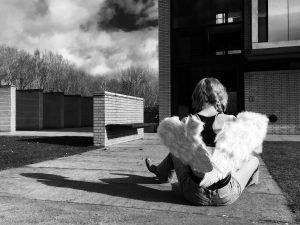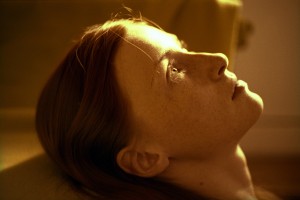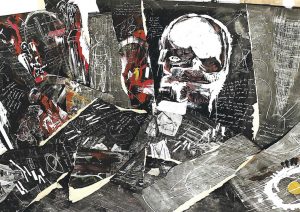
A reflection in glass
by Laura Gledhill | December 19, 2015
Traditional recitals of Rapunzel’s story barely delve into her thoughts during the final year or two in the tower, which is a shame, because they would probably reveal a telling doubt – a suspicion that the shades beyond her window were ultimately just a fancy, a dimension into which she’d never be able to stray.
It certainly seemed that way for Cinderella, too, I’ve no doubt, though the vision of this new world might have preoccupied her. I mean, anyone who lives in monochrome might be so preoccupied, their mind curling with sepia-tone daydreams and heavy-lidded prayers.
Let’s say that both girls, in fact, wondered whether they could really one day see cities rumoured to tend red roses in window-boxes and to wreath clouds through gullies and spires – where everything would stream in evocative and breathless motion. The beauty of dynamism itself, all airs and tides; the ebb of the intellect savouring a curious idea moving to the tingle of wind and sun on the nape of the neck. A tumult of curious people, whose words may prompt visions of another world or simply add melody to the clatter and rhythm of teacups on a desk or footsteps breaking the dark.
We can well imagine Rapunzel’s tower littered with magazine pages, and Cinderella tucking glossy fashion clippings under her bed, for we model the self on such ideals. It’s the notion, perhaps, of being a person to whom a fairy tale happens, which is what they privately felt they should be. And so here, on the magazine pages, were ladies with apple-blossom cheeks and poison lips: beautiful, capable, clever, and seemingly complete, in possession of that magnificent world which Rapunzel glimpsed piecemeal from her window. They were full, bloomed, while Rapunzel’s mind still seemed to fragment into dozens of idealised yet non-encompassing selves. At night, Cinderella made dusty sketches of costumes, fitting them to an interpretation of herself, casting herself as queen of hearts or rebellious jester or travelling bohemian. She laid the pages alongside each other, but each bore a different face. How to embody the flustered variety of her dreams, when they so easily contradicted each other, was beyond her.
She wished for a life that was as unified yet complex as a glass slipper; a life she could simply slip into, solid in form, yet shot through with the varied and subtle illuminations of a world of light. This guise, above any other, would reveal the true beauty she possessed and couldn’t yet perceive (though of course, that beauty would really have been there in the first place – merely ‘unseen’ or ‘eclipsed’, as they say in the stories.)
But she had to wonder, then, whether she would fit such a shoe and the world it beckoned her to step into, or whether that shoe would never fit. And of course, what was a princess without a glass slipper? She had reached an age where it would be naïve to dismiss the countless revellers at the ball as secondary to a personal romance, yet she still feared becoming one of them; to be left idling, sidelined, barefoot, unable to move onto the dance-floor.
(But then, she still wore shoes of her own choosing – flowery wellies that tracked a fancied Arctic, trainers that trod miles of dreaming hills, heels that wandered intoxicated through a street of stars. And when she did find shoes that vaguely resembled glass slippers, they turned out to be poor quality and, in the spin of feigned romance, she snapped the heel off the left one and limped home, leaning awkwardly against a tenacious friend.)
I mean, in a world where a single name doesn’t signal a cohesive narrative, Rapunzel may even have deserted her tower-born innocence to find people caught up in far worse oppressions than the one she’d so longed to escape. With luck, that knowledge might have directed her ardour outward, and perhaps she travelled or lectured or wrote. Perhaps Rapunzel’s story emerged from her own pen: a flurried attempt to secure an ideal in a world where she perceived the only consistency in its lack thereof.
Today’s Cinderella might not have danced at the palace ball in glass slippers, but waltzed instead on rain-tainted tarmac bathed in halogen and starlight. She did not possess a whole kingdom, but, with wits, she navigated one, and found great chambers dappled with flowers of light, and turrets set with marble hippogryphs. The structure of her mind, even, was whimsical and disparate as the real process of running through castle halls, with the walls moving constantly from gold to stone to tarnished silver; that vaguely cliché, distant glimpse of a hilltop castle, in all its sunset-webbed beauty, graced only the covers of the stories she wrote.
Oh, and this Cinderella also died of a brain tumour, aged twenty-three.
Her little life had been as a splint struck up momently in the dark. It coughed and spat and smoked and then blazed, and then it went out.
She died knowing that the intoxication of life was still to flee her blood. Undeniably, for those few posthumous years, the apples had blossomed. Her gravestone was inscribed, though – in the same gothic typeface she’d once pored over – with a comforting maxim; do not mourn that the candle has been put out, but that it was ever lit. There were successes, after all, and that splint once grew bright; that burnished hour of morning with friends on the roads of California, for one, or a friend’s shaky smile as their despair faded; a personal epiphany, a shift in perspective; the currency of life, equal to gold coins pressed on a black desk. You can still find the tombstone, if you look hard enough for it.
Rapunzel is still alive now, I believe, having made it to seventy-five. She stopped dyeing her hair blonde for a while and let it fade back to its natural ginger, which was awfully fashionable at first but then faded out of favour a few years later (not that she minded, being old enough by then to disregard society’s ideals). She did find cities she’d only once dreamed of, all mirrors and roses and water-wells. She had been present at the stirring of some revolutionary murmurs, stockading a banner above a deep of cries. She liked to think she had helped some, when that one unjust law was revoked (at least, in some places it was). She had experienced the vague desertion of falling asleep, on nights mixing breath with love or wrapped in abandonment or lost to the shimmer of a page.
And at the end of it all, now: nothing taken but ideals, nothing given but – oh, her child’s laughter, stars on the dark – flashes of beauty, moving with the clouds and the sea.
Image by Mai




